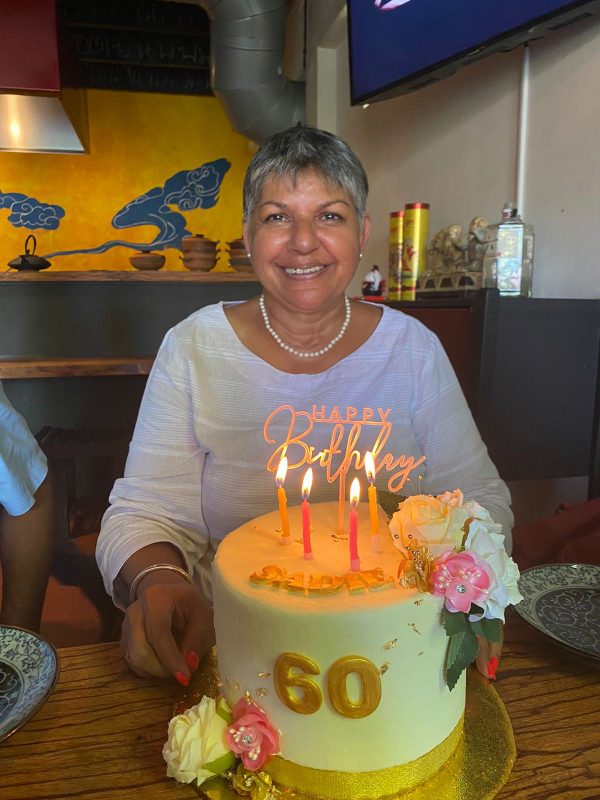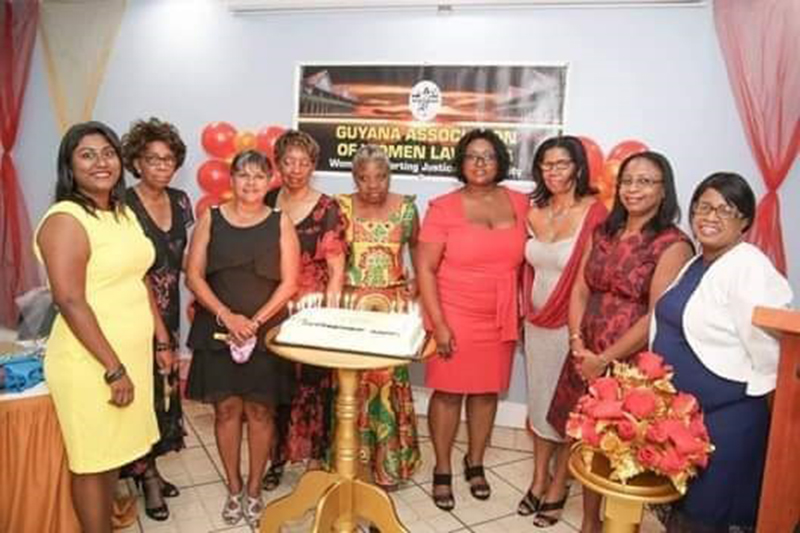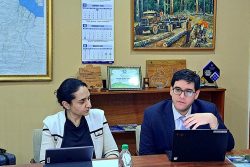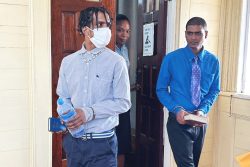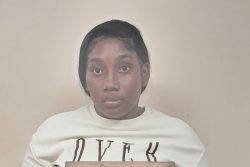If unconventional was a person it would have to be Sadie Amin, a woman who wears the hats of human rights advocate, sexual and reproductive health advocate, environmental advocate, cancer survivor and politician.
During a conversation with the attorney, who has no qualms about picking up garbage someone dropped on the roadway and asking the offender to throw it in the bin, one can go from hearing about how she chained herself to a tree in California to protest the felling of trees, to how she likes her rum and can match drinks with any man and not get wasted.
Amin talked, too, about how she is learning Spanish to assist Venezuelan and Cuban migrants who are being exploited and then with a deadpan expression shared how she ordered her husband, Reggie Bhagwandin (former chief executive officer of GuyOil) out of a bar because he was associating with someone whom she had cut off. In her words, they were partners and as partners they needed to do things together.
Between the two of them there have been five marriages. She is Bhagwandin’s third wife and he is her second husband. He has two sons but she opted in her early twenties not to have children and had her tubes tied. She is not offended when asked from time to time if she was barren; she usually explains it was her choice not to have children.
At the end of a one and half hour conversation (it did not feel that long as Amin is an consummate storyteller) it was obvious that Amin – an avowed atheist – has lived her life not conforming to society’s norms and as someone who wants to make the world a better place even if it is just by lecturing speedboat passengers about the importance of wearing life jackets.
This is a woman who once taught Science and History at Queen’s College and spent more than half of her $10,000 a month salary (the other part she spent in rum shops) to upgrade the Science lab at the school.
She wrote for and edited the Mirror newspaper at one point and also worked with late president Janet Jagan for over ten years. She was Jagan’s assistant when she was president and still has her framed appointment letter signed by Dr Roger Luncheon, which states that she would work for one dollar a year. “They never paid me my one dollar,” she said laughing.
A lawyer and the third of four children (three girls and one boy) Amin said she came from a family that saw volunteerism as important and this started with her grandfather, who not only led by the example to give back to those in need but stressed the importance of treating them with dignity. He was a village councillor, she said, and the family owned buses and while they had “a fairly privileged background” in the summertime they had to help those in need and also give back to the community.
“I have a very unconventional background, in that I lived in many countries… doing volunteer work…,” said Amin, a former student of the Bishops’ High School. While at that school she was a “horrible child,” she said, as she called in a bomb scare and did some smoking and drinking in her teenage years.
She shared that because she had the privilege of “not earning a living” as her parents took care of her, she had more time to spend on volunteering her time and energy wherever she saw fit.. Her father owned the Esso Gas Station at the corner of Regent and King streets for 45 years and they lived next door to the gas station.
Her father believed in education for women and according Amin, he “indulged his daughters. As long as we took in education, he didn’t care if we smoked or drank, which we did a lot…” Her eldest sister, who passed away two years ago in Canada from cancer, was a nurse and her second sister is a cardiologist who lives in Florida.
“I was the ultra-rebel without a cause. I did everything. My mother always said I gave her all the grey hairs…,” Amin recalled.
Protests
While studying for her degree in Sociology with a minor in Biochemistry at the California State University, Amin said, she was “doing a lot of protests”. She protested against apartheid in South Africa and for Nelson Mandela to be freed.
“I fell into a group of people who every Friday went to the South African embassy and we protested,” she recalled.
It was at that point that she became a serious person about injustices and wanted to help, realising that basic human dignity is a human right. Her volunteerism also extended to economic refugees who were going to the US from Central America and there was a point when their home became a place where people hid out and they would move them around and get them to a safe place.
As a foreigner in the US, Amin said, she could have been deported but she put herself “out like that and I was very politically involved in things that were going on around the world”. She was an ecological warrior as a member of Greenpeace, an independent global campaigning network, and she was a tree hugger. When the authorities wanted to cut down trees in California to build roads, she was one of the people who chained themselves to the trees. As she recalled this, she commented, “I was a little of a drama queen.
“So, the three things that took up most of my time in the 80s was protecting the environment, all the political refugees and what was going on in South Africa and then my involvement in women’s and reproductive rights.”
She received some rewards too as she managed to see Mandela in person when he gave a speech in Canada. She also met the late South African Bishop and anti-apartheid and human rights advocate Desmond Tutu, which she said, made her heart go “pitter-patter”. Another rewarding moment for her was spending six weeks in Guatemala picking coffee. She said the conditions people lived under were “horrifying” as women were raped and people were forced to leave their homes.
Even though she is pro-choice, Amin said back then and still, she is against women using abortion as a method of birth control.
“For many years I did not believe and I still don’t believe that you should engage in sexual activity [and] not be responsible by using something and then if you get pregnant you go and terminate. I am against that because you are using termination as a means of birth control and I think there are other ways of birth control,” Amin said.
A “die-hard feminist”, Amin said she found herself escorting women to abortion clinics in California, where they would be met with protests and their lawyers would always advise them not to cross the picket line or touch a picketer because they could be charged. These lawyers partially inspired Amin to become a lawyer – albeit it took some years.
At that time as well, Roe v Wade, 410 US 113, the landmark decision of the US Supreme Court that the Constitution of the United States conferred the right to have an abortion was also a big thing. Amin said she had also advocated for the ruling to be put into federal law instead of just remaining a court decision which could be overturned. Years down the line that fear became a reality as the decision was indeed overturned earlier this year.
Teaching
After living in a few countries and volunteering Amin returned to Guyana and taught at Queen’s College for some time.
“It was one of the best jobs. I loved teaching, but guess what? The salary. I was horrified – $10,800 a month, that was the salary in 1993 for a full-time graduated untrained teacher…,” she recalled.
She was supported by her parents so she gave back to the school, helping to upgrade the labs. Amin taught at QC while her then husband taught at Bishops’.
“And that husband left. Well we had a very amicable divorce. He was very nice. He wasn’t Guyanese and then I met husband number two who was very politically involved at UG and all of that…,” she said.
With two years of law in the US under her belt, Amin said, it was around that time that she decided to complete her law studies at UG, but through her husband she joined the Progressive Youth Organisation (the youth arm of the PPP). Her writing in the UG newspaper caught the attention of Janet Jagan, who invited her to write for the Mirror.
So she was teaching, going to UG and working at the Mirror, where she did not take a salary.
Jagan took her “under her wings”, she said, in the midst of her weeping after being lied upon by someone she knew, and told her that a woman entering politics had to have the skin of rhinoceros, barring which she should not return to the Mirror or Freedom House. It was after this that she worked with the late president for ten years.
After Jagan resigned, Amin continued to work for her at Freedom House and they became great friends. They shared a love for art, reading and costume jewellery.
In 2001, Amin ran for election but she was not placed in the National Assembly or given an official appointment and while she was a “little disappointed” she did not like the limelight but helped a lot of people in the background.
She had completed her law degree by then and remembered saying, “oh Lord what a go do with my little life now”. She did not wonder long as shortly after, with the assistance of her sisters (a doctor and nurse), acquaintances in the US and others, she began visiting Amerindian communities to educate them about reproductive health and give needed assistance. At that time, something happened that forced her to go to Hugh Wooding Law School. She recalled giving an opinion about the abortion law that was being enacted and being told by a female politician, ‘well you are not a lawyer’.
“I remember again I felt hurt and Mrs Jagan said to me, ‘well why don’t you go to Trinidad and get it done?’” she said.
She did just that and has been a lawyer for the past 18 years. She has a lucrative private practice, especially in Essequibo. Every month, the tenth new client who walks into her office is represented pro bono. In keeping with her feminist outlook, she does not represent men accused of domestic violence and she always tries to educate male clients to include their wives when dealing with land.
When Mrs Jagan died, Amin said, she felt estranged from the PPP as she had no other friend in it.
Amin is a former president of the Guyana Association of Women’s Lawyers and she recalled that was the late Debra Backer, whom she held as a dear friend, who encouraged her to join the association and also the Lion’s Club of D’Urban Park.
Privileged
Amin does not shy away from the fact that her upbringing was privileged and she shared that at a forum where others spoke about how they were brought up under difficult conditions, her story was about how her aunts became educated. One of her aunts was traditionally married off at a young age but her husband was an alcoholic and he died, leaving her widowed with a child at an early age.
She basically told her father she followed the tradition but became a widow and she wanted to go to England to study to become a nurse. That “opened the floodgates” for all of her aunts on her father’s side to become highly educated, she said.
Following in her grandfather’s footsteps, Amin has been giving back to society through different organisations over the years, but she prefers to do so away from the limelight.
Amin is someone who does not think twice about cutting friends off if they offend what she believes in and that includes gender issues, so some men had to be let go as friends from time to time. And don’t use the ‘N’ word around her. Writing letters to ministries to complain about issues are also on her agenda. As she puts it, she has “a big mouth and is always in trouble.
“No matter what, I don’t sit on the fence. I jump right inside. I pick a side…,” Amin said.
Her biggest pet peeve now is the over-sexualisation of children. “It irks me how we sexualise our children at a young age and it irks how we take the voice of a man over a young abused child,” she noted.
With regard to helping out Cubans and Venezuelans, Amin said she knows these women are exploited as sex workers in the interior and while she does not care if the women want to sell their bodies, she does not want them to be exploited.
“So that is my new focus now… I am learning Spanish because when I get called by any organisation to go and appear in court for the migrants, it is hard to have to be waiting for the interpreter,” she said.
“I am very low key. I don’t like to, as they say in Guyana, ‘pompaset’ me self… If I make a controversial statement, I stand by it and a lot of people know what my views are but I just don’t like promoting myself,” she said.
As an atheist, Amin said she wants her friends to have a “nice little Friday drink with the rum and cutters and whatever” on the night she dies and the next day she wants to be cremated at Memorial Gardens. With a few Bob Marley songs playing in the background, she wants her ashes to be thrown into the three rivers as she has connections to all of them – she lives in Demerara, has roots in Berbice and she works in Essequibo.


